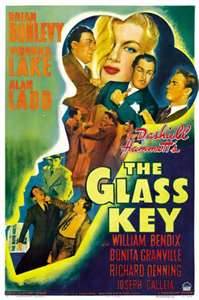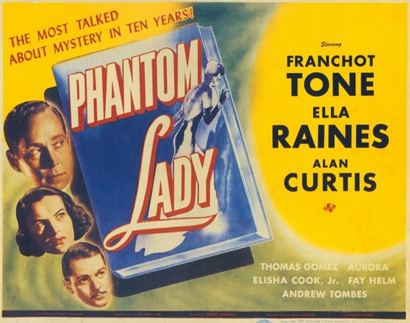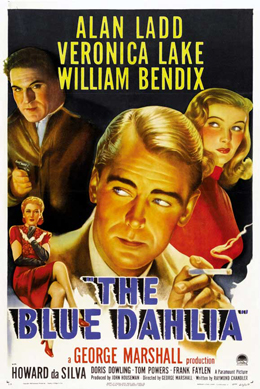
 |
|
|
|
Welcome to a trio of Class-A film classics from the years when early films noir were establishing a style of their own. The TCM Vault's long-delayed set of Dark Crimes Film Noir Thrillers were held up solely for being locked in the vaults of Universal, a studio that hasn't been too keen on releasing interesting library product, even titles as well-known to noir addicts as these. In the late 1950s Universal purchased the pre-1948 catalog of Paramount pictures, which accounts for the presence of two of these titles. They're true keepers with impressive pulp fiction pedigrees. One is adapted from a hardboiled classic by Dashiell Hammett and another from a story by pulp ace Cornell Woolrich. A third is a screen original by none other than Raymond Chandler. In them you'll find your fill of rainy streets, suspicious characters, steamy romance and hints of Production Code-discouraged sexuality. 
The Glass Key stands apart from most Production Code-approved tales of crooked elected officials and their dealings with crime lords, by taking the attitude that civic corruption is a commonplace state of affairs. Such was not the case in an earlier version starring George Raft, that altered the storyline significantly. Roughneck political wheel Paul Madvig (Brian Donlevy) shakes up the city when he decides to back a reform candidate dedicated to dismantling the very corruption Madvig represents. Paul has fallen madly in love with the reformer's daughter Janet Henry (Veronica Lake), even though she's leading him on only to help her father's chances for election. Paul's #1 operative Ed Beaumont (Alan Ladd) can't get his boss to see the truth in this, and spends the movie trying to smooth out a volatile situation. Gambling racketeer Nick Varna (Joseph Calleia) has been paying protection for years and doesn't appreciate Madvig's change of heart. If that's not enough, Janet's hotheaded brother Taylor (Richard Denning) owes Varna a big gambling debt, and Paul's impressionable sister Opal (Bonita Granville) is Taylor's girlfriend, and uses underhanded means to get the money for him. Before the loyalties and grudges and outright malice settle themselves, there will be an unsolved murder, several savage beatings and a number of surprising revelations about the characters. The moral and ethical issues in The Glass Key are a tangle. Alan Ladd's Ed Beaumont keeps his personal code of ethics well hidden. The best friend of the local political boss, he has no qualms about remaining mum while his employer is the likely suspect in a murder. Ed also conceals the fact that he's in love with the same woman that his boss is crazy about - he doesn't mind letting all of these personal issues remain unresolved. The serene Ed Beaumont commits crimes of his own, and remains the hero only because he tries to hold all the irreconcilable poles in balance. This ambivalence is central to the noir ethos. An accurate synopsis for this show would take two pages, as The Glass Key stays fairly close to Hammett's twisting yet always logical storyline. Relationships are everything in a city crisscrossed by conflicting alliances -- political, business, personal, and criminal. Paul Madvig's unwelcome romantic attentions are bad for business. Janet responds by protecting her own family interests, and may be a secret murderess herself. Ed refuses to jump to conclusions, and stays cool even when grilled by the cops. The real unstable character in the mix is gangster Varna's henchman Jeff (William Bendix). This thug is a real innovation for early noir: he loves to beat people, and thoroughly enjoys an extended torture session, working over the captive Ed. The Glass Key imports darker aspects of hardboiled fiction to the screen, helping to launch a new style that wouldn't be called noir for another decade, and even then only by French critics. Perhaps a few viewers in 1942 related Brian Donlevy's Paul Madvig to his comic character "The Boss" for Preston Sturges in the hilarious comedy The Great McGinty. Fans were more excited about the reunion of Alan Ladd and Veronica Lake from the terrific noir espionage tale This Gun for Hire. Apparently chosen because she was short enough to act alongside her 5'5" co-star, Lake barely got along with Ladd even though studio publicity invented a romantic relationship. They remained one of the most popular romantic duos of the forties, and three of their four outings are classic films noir. 
1944's Phantom Lady was a career triumph for director Robert Siodmak, who fled Germany long after his confreres Billy Wilder and Fred Zinnemann and had a tough time establishing himself in Hollywood. Teaming up with former Hitchcock writer and collaborator Joan Harrison, Siodmak invested this economical Universal production with a heavy dose of expressionism. Harrison had writing credits on several Alfred Hitchcock hits, including Universal's Saboteur; for Phantom Lady she chose playwright Bernard C. Schoenfeld to adapt a Cornell Woolrich story. What must have read like a bad Hitchcock imitation turns to gold thanks to Siodmak's interesting direction and the resourceful, atmospheric cinematography of cameraman Woody Bredell. Scott Henderson (Alan Curtis) argues with his wife and spends the evening with a mysterious woman who refuses to identify herself. When he returns he finds his apartment full of policemen: his wife has been murdered and he cannot produce an alibi or a witness. Neither a bartender, an entertainer (Aurora Miranda) nor an orchestra drummer (Elisha Cook, Jr.) will corroborate his story, and Scott is soon in prison awaiting execution. That's when his secretary Carol Richman (Ella Raines) steps in. Advised by Scott's best friend Jack Marlow (Franchot Tone), Carol tries to find out why the witnesses wouldn't help her employer. The detective on the case (Thomas Gomez) warns Carol against playing amateur sleuth, and Scott's pessimistic attitude doesn't help either. But then it becomes apparent that someone has been spreading bribe money around. Phantom Lady is only so-so as a mystery; most viewers paying attention will deduce the real killer long before the film reveals it. But that becomes entirely beside the point in an emotionally satisfying movie constructed of nearly perfect, atmospheric scenes that make unlikely events seem plausible. Scott doesn't press his phantom lady' to reveal her identity, and we get an amusing scene where the entertainer becomes annoyed that she is wearing a custom hat identical to her own. The 'phantom lady' also attracts the attention of Elisha Cook's randy drummer, Cliff. When Carol investigates, she pretends to be a jazz fan at a private midnight jam session staged and filmed to emphasize the drummer's sexual release. It's the most famous scene in the film -- the crazy angles and the sweaty, leering Cliff produce a tawdry sex charge that wouldn't be equaled until Siodmak paired Yvonne de Carlo and Burt Lancaster for a nightclub rumba four years later in his Criss Cross. As for raw sex energy, nothing touches the scene. Who would have thought that perennial loser Elisha Cook could ever be convincing as a sex crazed musician and ladies' man? Elsewhere Siodmak and Bredell collaborate to create moody scenes with low-key lighting, building on the look of Val Lewton's films over at RKO. Carol confers with the condemned Scott in silhouette shots in a dark prison room that seems like nothing from real life. An unadorned set for a lonely elevated rail station becomes as threatening as a haunted house. What makes Phantom Lady noir is the unhappy, unhinged underworld that Carol's investigations uncover. Characters suffer from depression or are psychosis. Otherwise decent citizens are easily bribed to condemn an innocent man. Only Carol's refusal to give up stands in the way of Scott's execution. Joan Harrison built on this early success to continue producing with and without Alfred Hitchcock, eventually working on over two hundred TV episodes of Alfred Hitchcock Presents. 
The best-known title in the set is 1946's The Blue Dahlia, another Paramount re-teaming of Alan Ladd and Veronica Lake, and perhaps their best picture together. It was so popular that the press dubbed a notorious, grotesque Hollywood killing a few months later as 'The Black Dahlia' murder case. The original story by author Raymond Chandler, the creator of the detective Philip Marlowe, centers on what could be the dark side of the post-war hit The Best Years of Our Lives: three war buddies, one with a severe battle injury, return to find that things have changed on the home front. Navy buddies Johnny Morrison, Buzz Wanchek and George Copeland (Alan Ladd, William Bendix & Hugh Beaumont) alight from a bus in Hollywood, looking to pick up their lives where they left off several years before. George has put his legal career on hold to help settle Buzz, who has returned with a steel plate in his head that apparently creates emotional disturbances -- he becomes surly and violent in uncomfortable situations or when listening to the jazzy big band music he calls 'monkey music.' Johnny returns to his wife Helen (Doris Dowling) only to find her a changed woman: she's giving a party for a lot of boozy friends in their bungalow apartment and is apparently carrying on an affair with Eddie Harwood (Howard Da Silva), the owner of the swank Sunset Strip nightclub The Blue Dahlia. Worse, Helen tells Johnny that his young son is dead, due to her drunken driving. In a funk, Johnny flees town, and by coincidence gives a lift to Joyce (Veronica Lake), who happens to be Eddie's estranged wife. When they reach Malibu, Johnny learns that Helen has been murdered -- and that he is the focus of a police manhunt. Meanwhile, the sleazy house detective (Will Wright) tries to blackmail Eddie Harwood with the knowledge that he returned to Helen's apartment later that evening. George also lost track of the volatile Buzz, who had been told about Helen and may have killed her himself. Johnny becomes the prey of crooks out for a reward, and discovers that Eddie Harwood has a notorious past as a killer, under another name. The veterans have returned from war, only to find more trouble at home. The Blue Dahlia was a smash hit for the multitalented producer John Houseman, whose name would become synonymous with adventurous Hollywood filmmaking: Letter from an Unknown Woman, They Live By Night, On Dangerous Ground, The Bad and the Beautiful, Lust for Life. The screenplay is Raymond Chandler's first screen original, and it's a tightly constructed tale of sleazy doings in a mix of tawdry and glamorous surroundings. As a hunted man Johnny has to strike out at bad guys in all directions, when the real problem might be with his best friend, Buzz. William Bendix has his best screen role as the confused wounded veteran. The show abounds in effective scenes, none better than the way Buzz is suddenly ready to kill another returning veteran (Anthony Costello) over a song being played in a jukebox. The war is barely over, but its traumatic violence has seemingly come home to roost. The Paramount gloss treatment fits a booze party in a private bungalow court, but less glamorous settings range from a dingy boarding house to the expected gangster hideouts. There's something guilty about the whole So-Cal setup, with Eddie Harwood raking in easy dough on the Sunset Strip and a pack of overdressed layabouts spending all their time at parties. Johnny, Buzz and George must be shocked to think that they risked their lives fighting so that these lizards could take it easy back home. Johnny finds his family destroyed, and even Joyce may be tangled up in the general corruption that let it happen. Chandler's own The Big Sleep with Bogart and Bacall was released the same year, but its myths seem part of an older, pre-war myth. For The Blue Dahlia Chandler came up with a thriller premise more in step with the times. The TCM Vault Collection's DVD set of Dark Crimes Film Noir Thrillers presents its three features in excellent transfers. Although Blu-rays would have been even more welcome, we're not complaining -- we've been waiting ten years for these prime noir titles. TCM throws in menus containing galleries of photos and original posters and other ad artwork, and an occasional essay with production notes. The one major disappointment is the absence of closed captioning or English subtitles. The very large hearing-impaired audience is just the customer base that looks to home video of vintage films for entertainment.
On a scale of Excellent, Good, Fair, and Poor,
Dark Crimes Film Noir Thrillers Blu-ray rates:
Reviews on the Savant main site have additional credits information and are often updated and annotated with reader input and graphics. Also, don't forget the 2011 Savant Wish List. T'was Ever Thus.
Review Staff | About DVD Talk | Newsletter Subscribe | Join DVD Talk Forum |
| ||||||||||||||||||